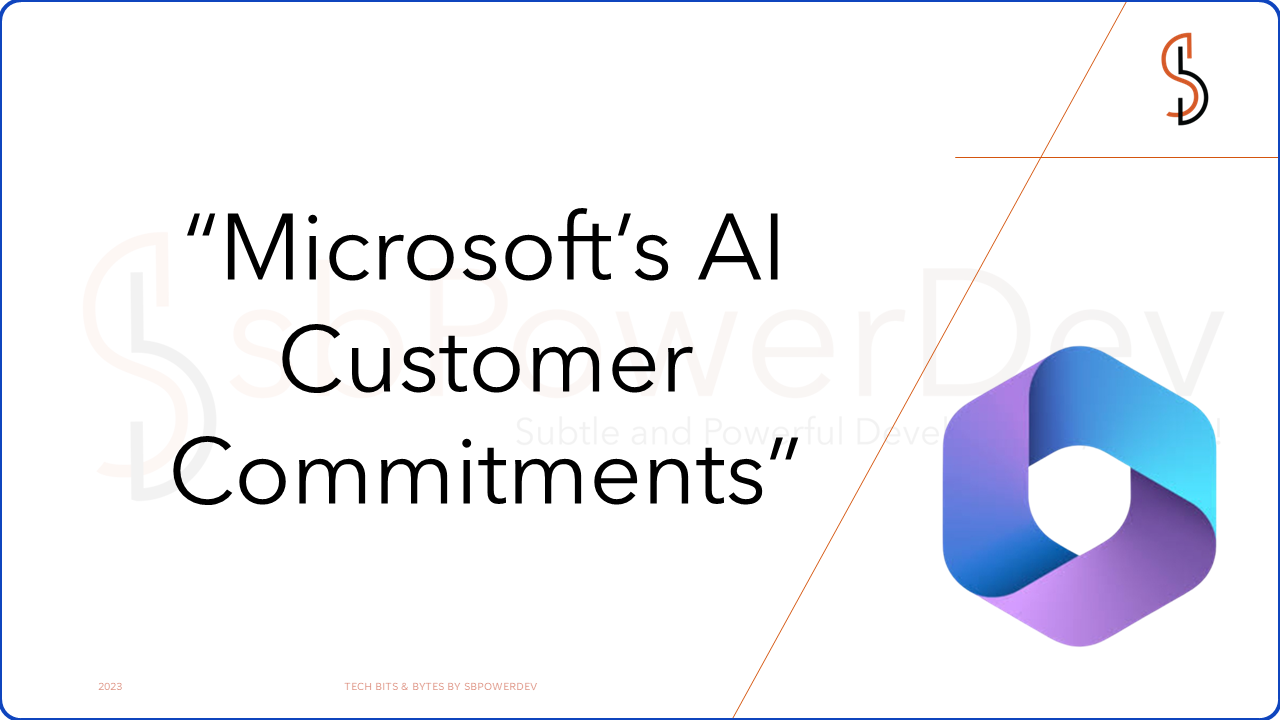
Unparalleled opportunities are being created by AI for companies of all sizes and in every sector. Our customers are embracing AI services to spur innovation, boost productivity, and address pressing human issues like the creation of ground-breaking medical treatments and novel approaches to combating the effects of climate change.
Simultaneously, there are rational worries about the technology’s strength and the possibility that it would be used to harm people rather than help them. In light of this, it is not unexpected that governments worldwide are examining how current rules and regulations might be applied to AI and o AI and determining whether new legal frameworks would be required. Every organization that develops or utilizes AI systems will need to establish and implement its own governance structures, as ensuring the proper boundaries for the responsible use of AI will not be limited to technology corporations and governments. We are launching three AI Customer Commitments today to help our clients on their journey toward responsible AI in light of this.
In order to help you understand how to safely build and use AI, we will first share what we are learning with you. Since 2017, Microsoft has been utilizing the expertise of close to 350 engineers, attorneys, and policy experts who are committed to putting in place a strong governance mechanism that directs the design, development, and deployment of AI in a safe, secure, and transparent manner. More precisely, we are
- Sharing expertise: We are committed to sharing this knowledge and expertise with you by publishing the key documents we developed during this process so that you can learn from our experiences. These include our Responsible AI Standard, AI Impact Assessment Template, AI Impact Assessment Guide, Transparency Notes, and detailed primers on the implementation of our responsible AI by design approach.
- Providing training curriculum: We will also share the work we are doing to build a practice and culture of responsible AI at Microsoft, including key parts of the curriculum that we use to train Microsoft employees.
- Creating dedicated resources: We will invest in dedicated resources and expertise in regions around the world to respond to your questions about deploying and using AI responsibly.
Second, we are creating an AI Assurance Program to help you ensure that the AI applications you deploy on our platforms meet the legal and regulatory requirements for responsible AI. This program will include the following elements:
- Regulator engagement support: We have extensive experience helping customers in the public sector and highly regulated industries manage the spectrum of regulatory issues that arise when dealing with the use of information technology. For example, in the global financial services industry, we worked closely for a number of years with both customers and regulators to ensure that this industry could pursue digital transformation on the cloud while complying with its regulatory obligations. One learning from this experience has been the industry’s requirement that financial institutions verify customer identities, establish risk profiles and monitor transactions to help detect suspicious activity, the “know your customer” requirements. We believe that this approach can apply to AI in what we are calling “KY3C,” an approach that creates certain obligations to know one’s cloud, one’s customers and one’s content. We want to work with you to apply KY3C as part of our AI Assurance Program.
- Risk framework implementation: We will attest to how we are implementing the AI Risk Management Framework recently published by the U.S. National Institute of Standards and Technology (NIST) and will share our experience engaging with NIST’s important ongoing work in this area.
- Customer councils: We will bring customers together in customer councils to hear their views on how we can deliver the most relevant and compliant AI technology and tools.
- Regulatory advocacy: Finally, we’ll play an active role in engaging with governments to promote effective and interoperable AI regulation. The recently launched Microsoft blueprint for AI governance presents our proposals to governments and other stakeholders for appropriate regulatory frameworks for AI. We have made available a presentation of this blueprint by Microsoft Vice Chair and President Brad Smith and a white paper discussing it in detail.
Third, We’ll help you ethically build your own AI systems, and we’ll create responsible AI programs for our ecosystem partners.
- Dedicated resources: We will create a dedicated team of AI legal and regulatory experts in regions around the world as a resource for you to support your implementation of responsible AI governance systems in your businesses.
- Partner support: Many of our partners have already created comprehensive practices to help customers evaluate, test, adopt and commercialize AI solutions, including creating their own responsible AI systems. We are launching a program with selected partners to leverage this expertise to assist our mutual customers in deploying their own responsible AI systems. Today we can announce that PwC and EY are our launch partners for this exciting program.
We are aware that these pledges are just the beginning and that as technology and regulatory frameworks advance, we will need to build on them. But as we move forward on the ethical AI journey together, we are also thrilled by this chance to work more directly with our clients.















